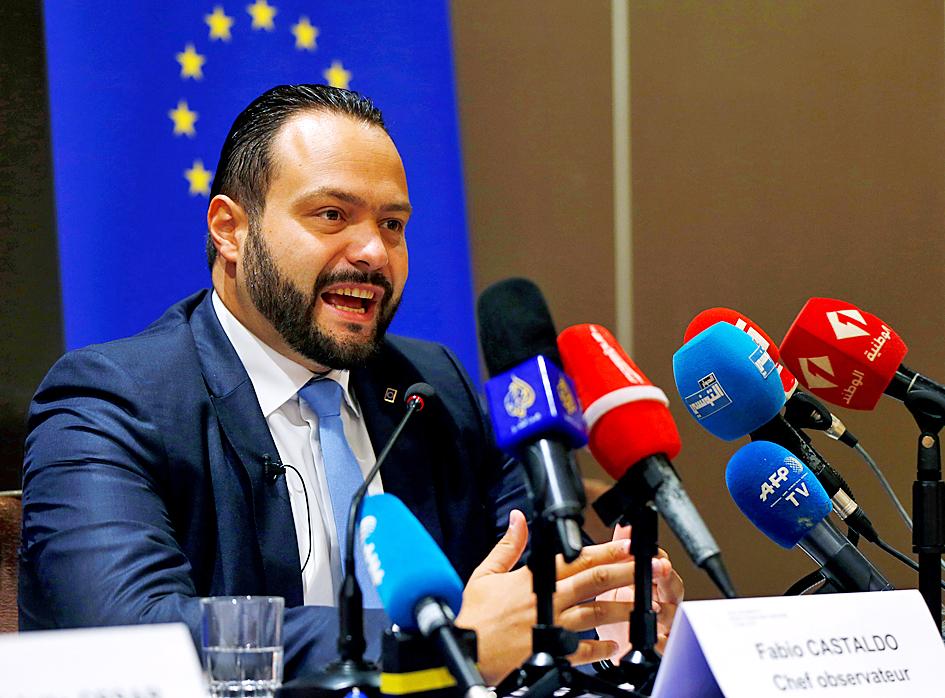The EU cannot tolerate increasing human rights abuses or remain silent in the face of an increasingly expansionist and aggressive foreign policy in the Indo-Pacific region and on a global scale, European Parliament Vice President Fabio Massimo Castaldo said in reference to China.
Castaldo made the remarks in an interview with Italian daily Il Manifesto published on Friday.
Compared with China’s advances in the region, Taiwan presents an alternative model, Castaldo said.

Photo: Reuters
The importance of deepening relations with Taiwan lies in that the nation and the EU share the values of democracy and freedom based on pluralism, and they fully respect the rule of law, he said.
If the EU wants to bolster its diplomatic and economic presence in the Indo-Pacific region amid intensifying confrontations between rival powers, it would be impossible not to develop closer relations with partners that share common values and principles, including Taiwan, Japan, India, Indonesia and South Korea, he said.
Castaldo also commented on a report passed last week by the European Parliament Committee on Foreign Affairs urging the EU to improve its relations with Taiwan.
The report says that the EU is increasingly concerned with China’s activities in the Indo-Pacific region, Castaldo said.
In the report, he emphasized Taiwan’s important position in the global supply chain and said that China has continued to obstruct the nation’s access to COVID-19 vaccines.
Regarding China’s retaliatory measures against Lithuania’s rapprochement with Taiwan and its protest against members of the European Parliament following the report, Castaldo used Hong Kong as an example, saying that Hungarian Prime Minister Viktor Orban’s government had twice vetoed EU declarations of support for Hong Kong, undermining the internal solidarity of the EU.
The EU’s foreign policy cannot be taken hostage by vetoes or influenced by governments with financial interests, he said.
If the bloc’s 27 member states can act in unity, they would become leading figures in international politics, economy and diplomacy, he said.
On the other hand, if they are divided, they would be vulnerable and become irrelevant, he said.
Castaldo added on Facebook that it was time for Europe to strongly support bolstering relations with Taiwan.
Castado is the youngest European Parliament vice president in history, elected to office in 2017 at the age of 32.
He is a non-attached member of the European Parliament and a member of Italy’s anti-establishment Five Star Movement, the largest party in the country’s parliament.

Conflict with Taiwan could leave China with “massive economic disruption, catastrophic military losses, significant social unrest, and devastating sanctions,” a US think tank said in a report released on Monday. The German Marshall Fund released a report titled If China Attacks Taiwan: The Consequences for China of “Minor Conflict” and “Major War” Scenarios. The report details the “massive” economic, military, social and international costs to China in the event of a minor conflict or major war with Taiwan, estimating that the Chinese People’s Liberation Army (PLA) could sustain losses of more than half of its active-duty ground forces, including 100,000 troops. Understanding Chinese

The Ministry of Foreign Affairs (MOFA) yesterday said it is closely monitoring developments in Venezuela, and would continue to cooperate with democratic allies and work together for regional and global security, stability, and prosperity. The remarks came after the US on Saturday launched a series of airstrikes in Venezuela and kidnapped Venezuelan President Nicolas Maduro, who was later flown to New York along with his wife. The pair face US charges related to drug trafficking and alleged cooperation with gangs designated as terrorist organizations. Maduro has denied the allegations. The ministry said that it is closely monitoring the political and economic situation

‘SLICING METHOD’: In the event of a blockade, the China Coast Guard would intercept Taiwanese ships while its navy would seek to deter foreign intervention China’s military drills around Taiwan this week signaled potential strategies to cut the nation off from energy supplies and foreign military assistance, a US think tank report said. The Chinese People’s Liberation Army (PLA) conducted what it called “Justice Mission 2025” exercises from Monday to Tuesday in five maritime zones and airspace around Taiwan, calling them a warning to “Taiwanese independence” forces. In a report released on Wednesday, the Institute for the Study of War said the exercises effectively simulated blocking shipping routes to major port cities, including Kaohsiung, Keelung and Hualien. Taiwan would be highly vulnerable under such a blockade, because it

UNRELENTING: China attempted cyberattacks on Taiwan’s critical infrastructure 2.63 million times per day last year, up from 1.23 million in 2023, the NSB said China’s cyberarmy has long engaged in cyberattacks against Taiwan’s critical infrastructure, employing diverse and evolving tactics, the National Security Bureau (NSB) said yesterday, adding that cyberattacks on critical energy infrastructure last year increased 10-fold compared with the previous year. The NSB yesterday released a report titled Analysis on China’s Cyber Threats to Taiwan’s Critical Infrastructure in 2025, outlining the number of cyberattacks, major tactics and hacker groups. Taiwan’s national intelligence community identified a large number of cybersecurity incidents last year, the bureau said in a statement. China’s cyberarmy last year launched an average of 2.63 million intrusion attempts per day targeting Taiwan’s critical